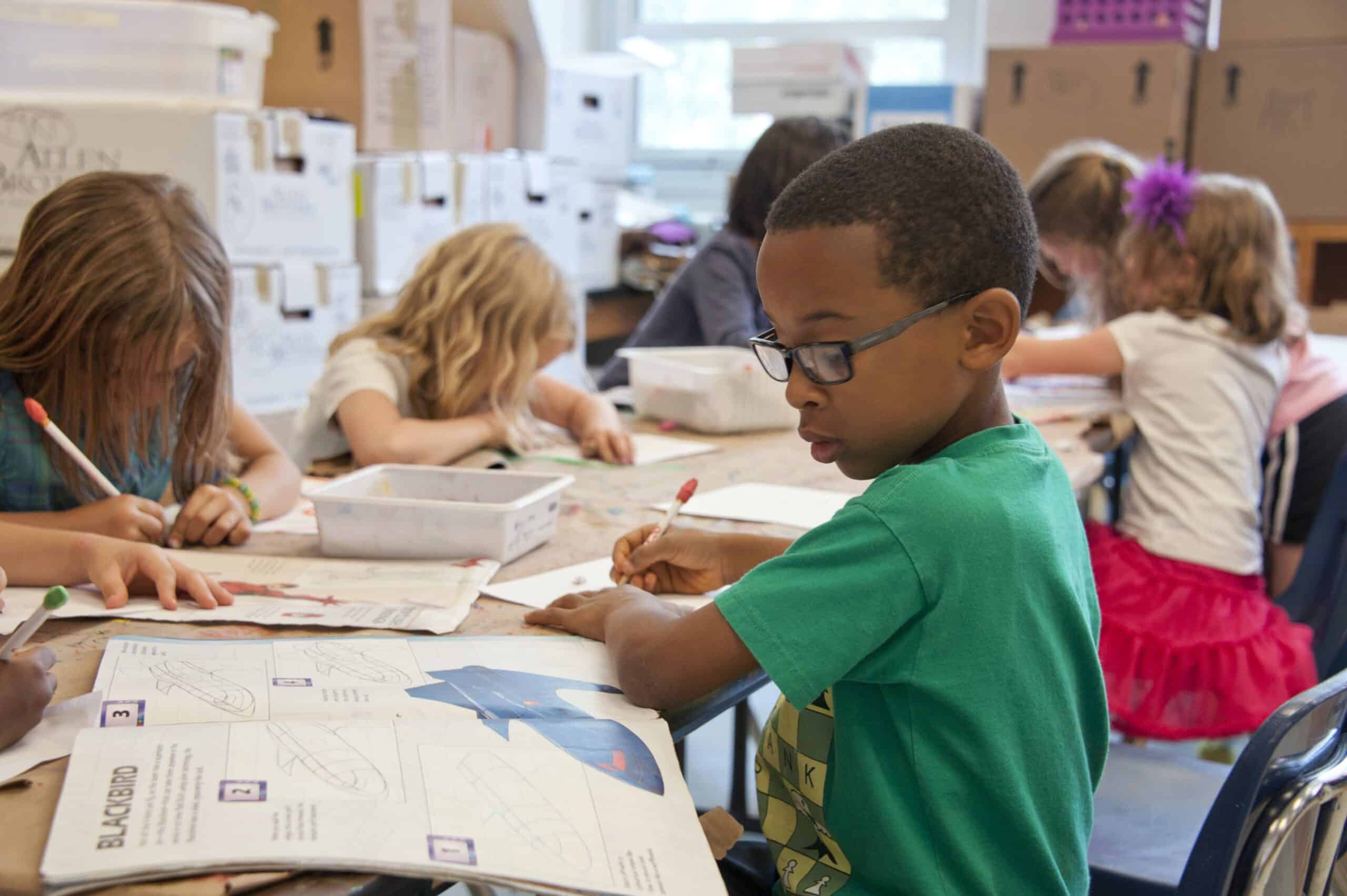[ad_1]
Key takeaways for caregivers
- Preschool lays a basis for elementary faculty college students to succeed.
- In the USA, as kids method kindergarten entry, it’s more and more frequent for 4-year-olds to be in non-parental group care and training, typically in a center- or school-based setting the place they will study alongside friends.
- For children from low-income communities, free public preschool is extra inexpensive than personal care, which will be very costly.
- Analysis has revealed advantages of preschool attendance in sure areas of literacy and math, particularly for youngsters from low-income communities; nonetheless, variations between kids who do and don’t attend preschool typically fade as early as kindergarten.
- Our new examine reveals that formal, center-based preschool training provides kids a major and lasting increase heading into first grade relating to a wider array of abilities than have been beforehand studied.
- These wider skills embrace language abilities (e.g., vocabulary information and sentence comprehension) and math abilities (e.g., understanding ideas wanted for counting and arithmetic).
To know the case for public preschool and the advantages, we’ll discover the next:
- Requires common preschool have been criticized when preschool advantages seem short-lived
- Most proof of short-lived advantages was particular to a slender set of abilities
- Preschool would possibly present longer-lasting advantages in a broader set of abilities
- Preschool advantages for math and language lasted at the very least into first grade
- Preschool results on government operate abilities could also be too gradual to detect by first grade
- Preschool might help cut back results of income- and race/ethnicity-based inequalities

Preschool kids coloring. Photograph by CDC on Pexels.
1. Requires common preschool have been criticized when preschool advantages seem short-lived
In recent times, U.S. training policymakers on the native and nationwide ranges have more and more known as for common preschool training. The truth is, “preschool for all” – free, high-quality preschool accessible for all 4-year-olds regardless of their household’s revenue or the place they dwell – has been a key initiative of current and present presidential administrations.
Such initiatives construct on proof that preschool helps kids’s improvement of basic educational abilities in studying and math, with robust advantages for youngsters from low-income communities. Thus, public preschool is taken into account a promising technique for decreasing income-based gaps in alternative and achievement.
Critics of those initiatives typically argue that the demonstrated educational advantages of preschool are short-lived, with some research displaying that advantages fade throughout kindergarten (e.g., Lipsey et al., 2018; Phillips et al., 2017). Why ought to policymakers search to increase a program that may not produce lasting results when there are various different calls for for restricted sources?
Equally, caregivers making choices for their very own younger kids’s care should juggle a number of monetary and logistical issues and private preferences for his or her kids’s first years. Caregivers could marvel if they need to ship their kids to preschool, unsure what the advantages are and if they are going to final.
Public preschool is taken into account a promising technique for decreasing income-based gaps in alternative and achievement.
2. Most proof of short-lived advantages was particular to a slender set of abilities
Lots of the research that exposed solely short-lived advantages of preschool targeted on a slender set of particular language abilities (e.g., figuring out letters and phrases) or math abilities (e.g., fixing phrase issues). These abilities are vital however omit an unlimited array of different vital foundational capacities that preschool would possibly foster.
For instance, does preschool facilitate kids’s vocabulary phrase information or their understanding of grammar and the way sentences are structured? Does preschool assist early improvement of discrete math abilities that underlie multidimensional duties like fixing math phrase issues? Even when problem-solving advantages are short-lived, there may be longer-lasting good points in abilities which might be foundational to counting and arithmetic (e.g., the power to shortly determine which numeral is larger).

A preschool trainer reads to younger kids. Photograph by Yan Krukau from Pexels.
3. Preschool would possibly present longer-lasting advantages in a broader set of abilities
To assist make clear the advantages of preschool, we worked to capture a broader picture of kids’s improvement. We relied on a various pattern of roughly 1,000 college students attending public preschool in Tulsa, Oklahoma. The scholars had been solely from households with low incomes and had been largely college students of coloration (roughly 50% Hispanic/Latinx and 20% Black).
Most kids had attended public preschool within the 12 months earlier than kindergarten: both pre-kindergarten in a public faculty or a Head Begin early-childhood middle. We in contrast these public preschool college students to kids who stayed residence with a caregiver within the 12 months earlier than kindergarten. Since researchers have documented variations between traits of kids and households who enroll in preschool and traits of those that don’t, we used statistical strategies that partially adjusted for these variations. This method allowed us to discover the function of preschool, particularly, on foundational abilities for youngsters’s educational studying.
Transferring past letter-word identification and math phrase downside fixing, we measured kids’s talents in several dimensions of language and literacy abilities and of math abilities, comparable to vocabulary, sentence construction, and numerical fluency (recognizing symbolic numerals shortly and precisely). We additionally in contrast the preschool college students to non-preschool college students on executive functioning skills – abilities that underlie kids’s talents to maintain guidelines and directions of their reminiscence, and comply with these guidelines by controlling their impulses and habits. We assessed all these abilities – broader language, literacy, and math abilities, in addition to government functioning abilities – in kindergarten and once more in first grade.
4. Preschool advantages for math and language lasted at the very least into first grade
Our outcomes confirmed that kids who attended preschool scored increased than their friends who didn’t attend preschool of their understanding of math and language ideas. Much more considerably, this preschool increase didn’t fade out by kindergarten or first grade.
These outcomes give us new causes to consider and put money into the ability of preschool: As kids enter elementary faculty, the benefits they gained in preschool carry via with them, placing them forward of their friends as they transfer ahead of their studying. Though we now have not but formally studied these college students into increased grades, the increase preschool college students gained in foundational abilities for classroom studying would possibly assist them proceed to carry out at the next degree than friends who didn’t attend preschool. This might imply that kids who attend preschool usually tend to advance into increased skills-based studying teams (known as gifted and proficient or monitoring in some faculty districts) than their friends, or that they merely really feel extra profitable of their lecture rooms going ahead.

Preschool kids eat fruit collectively. Photograph by Naomi Shi on Pexels.
5. Preschool results on government operate abilities could also be too gradual to detect by first grade
We didn’t discover any profit of getting attended preschool to children’s executive functioning skills in kindergarten or first grade. Whereas disappointing, this consequence mirrors different current public preschool evaluations in Virginia and Boston. Some suspect that government functioning abilities could present a sample of extra gradual progress and profit from preschool, so a lift from preschool attendance could present up later – a so-called sleeper impact. We are going to discover this chance in our follow-up work as kids age.
6. Preschool might help cut back results of income- and race/ethnicity-based inequalities
The optimistic results of preschool on math and language abilities could have been amplified by the make-up of our members. All the youngsters in our examine had been college students from low-income households, a gaggle that’s particularly advantaged by preschool attendance (Phillips et al., 2017; Yoshikawa et al., 2013). The magnified advantages for low-income teams present the significance of preschool much more, as it may possibly assist shut early income-based studying and alternative gaps. Our examine’s members had been additionally primarily kids of coloration, one other marginalized group that might be lifted by increasing public preschool to assist shut historic race/ethnicity-based inequalities in entry to high quality training.
Conclusion: Preschool can profit kids’s early studying to assist set them up for fulfillment
Fairly than proceed to argue over whether or not preschool works or is value it, we must always purpose to make preschool more practical and accessible for everybody so all kids – and particularly these furthest from alternative – have the strongest doable begins for his or her futures.
After we delved deeper to look at a broader array of abilities than had been studied in previous analysis, we discovered that kids who attended preschool had better talents in foundational elements of math and language studying. Moreover, these advantages lasted longer than beforehand proven. With these outcomes, it’s clear that public preschool provides kids from low-income backgrounds a sustained studying increase past kindergarten and into first grade, suggesting that there’s extra to the story than we beforehand believed. The truth is, our latest publication discusses our findings from following these kids into third grade. See our website for extra info.
Subsequently, fairly than proceed to argue over whether or not preschool works or is value it, we must always purpose to make preschool more practical and accessible for everybody so all kids – and particularly these furthest from alternative – have the strongest doable begins for his or her futures.
[ad_2]
Source_link



